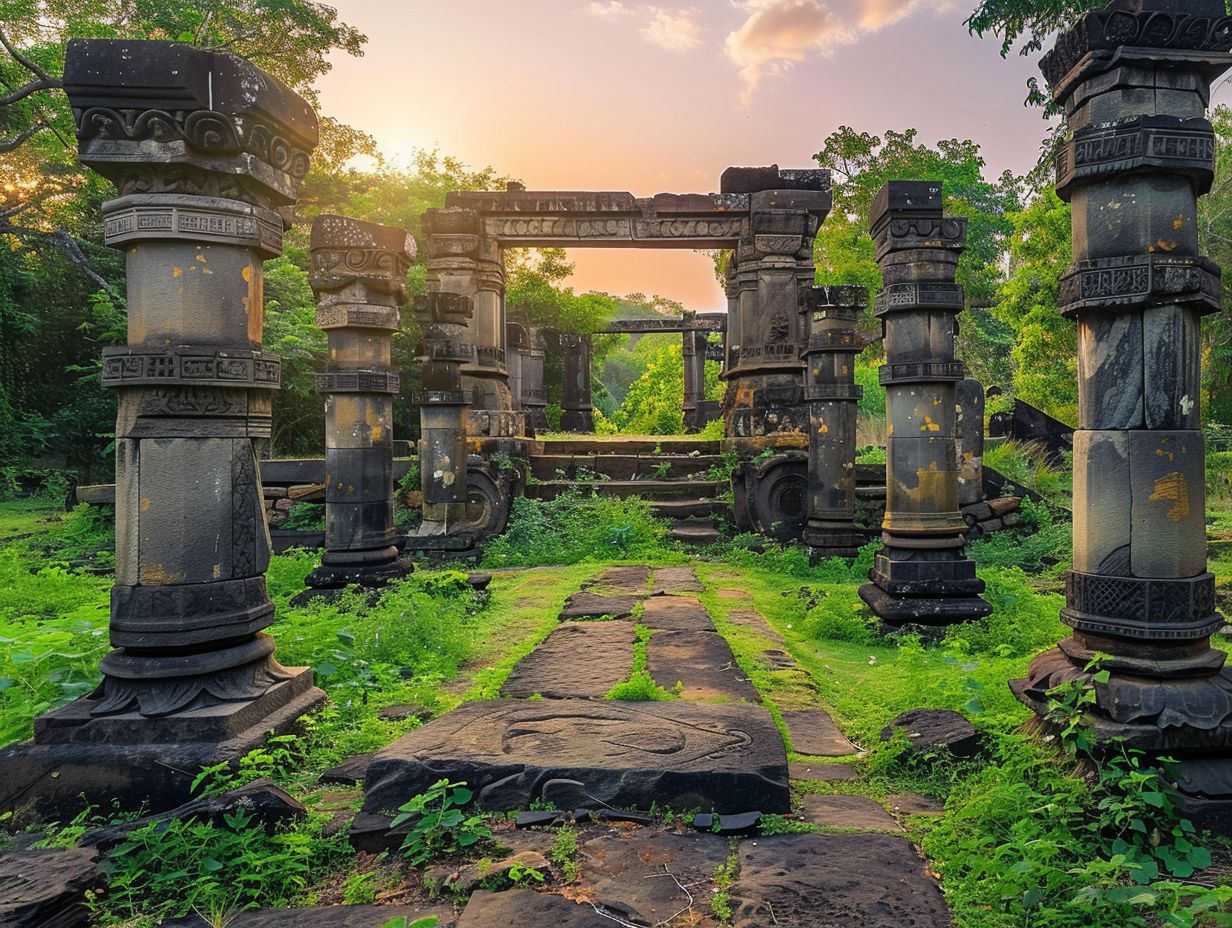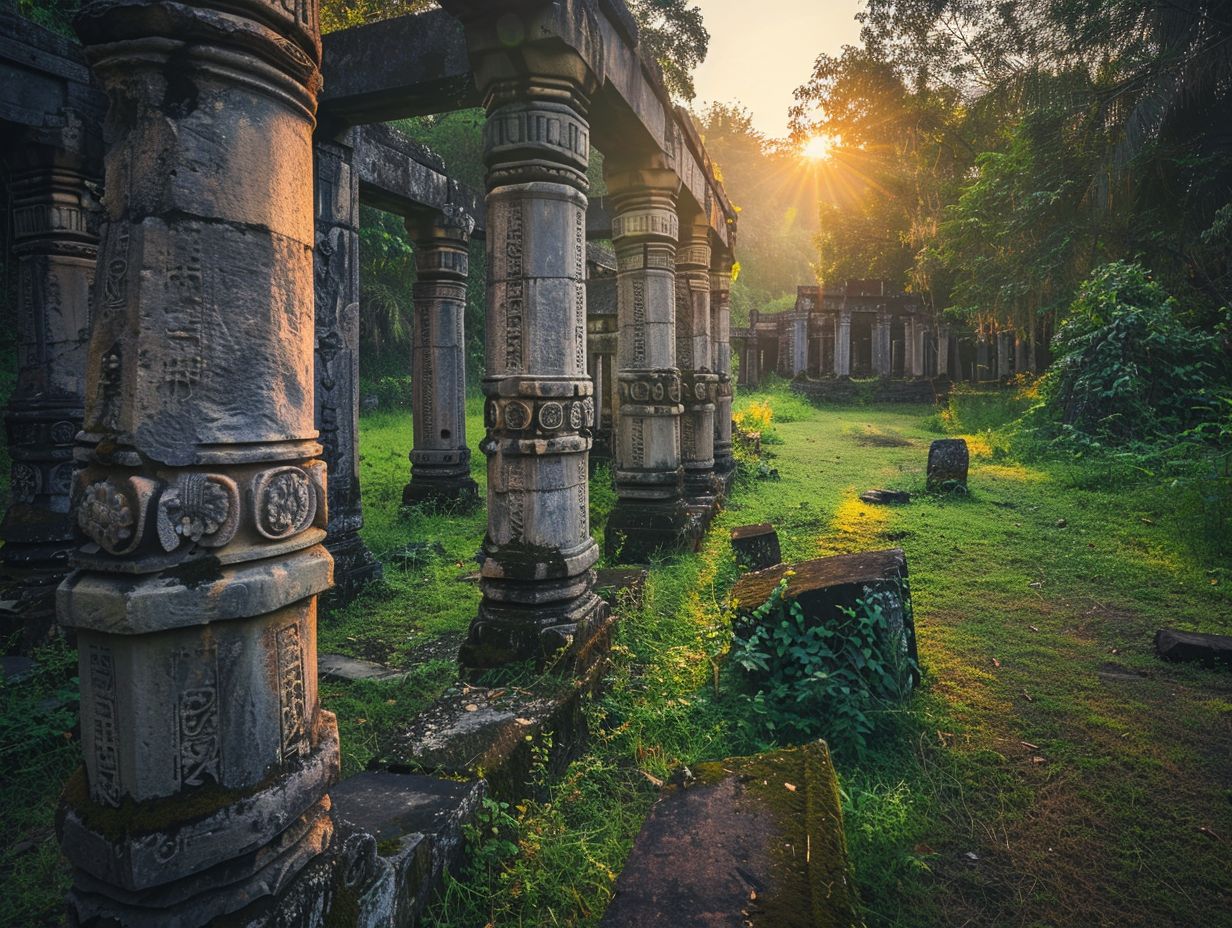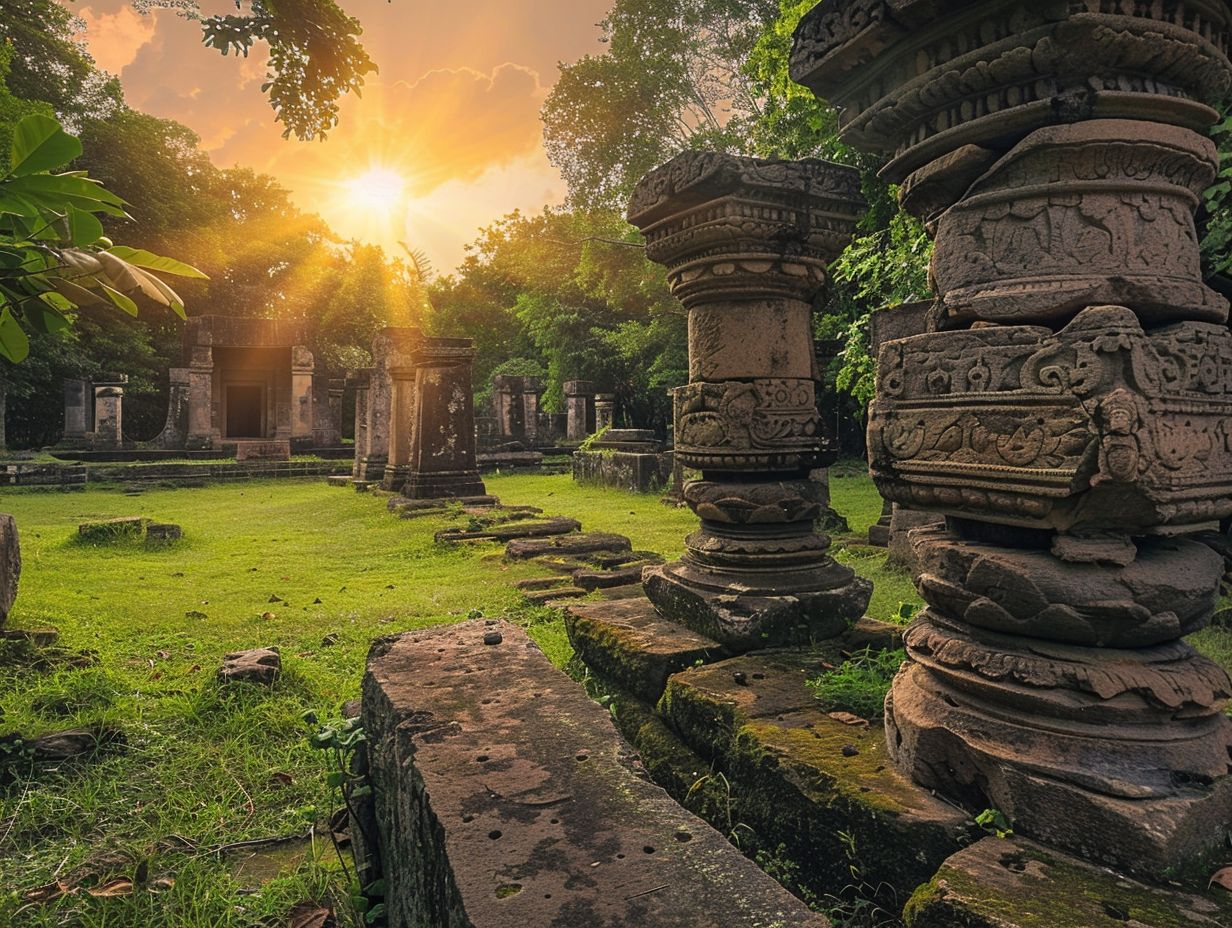Beliefs and Historical Significance of Ajivikas
The Ajivikas, a lesser-known philosophical sect of ancient India, provide a captivating insight into the rich spiritual tapestry of their era. Emerging alongside prominent movements such as Buddhism and Jainism, the Ajivikas championed distinctive beliefs rooted in determinism, fatalism, and the transmigration of souls.
Their ascetic practices and teachings not only shaped the religious landscape of their time but also attracted the support of influential figures, including Emperor Ashoka. Despite their contributions, the Ajivikas encountered considerable criticism and controversies that ultimately led to their decline.
The investigation into the intriguing history, core beliefs, and enduring impact of the Ajivikas reveals a profound narrative that enriches our understanding of ancient Indian philosophy.
Who Were the Ajivikas?

The Ajivikas emerged as a distinguished sect in ancient India, coexisting with other influential philosophical schools such as Buddhism and Jainism. They cultivated a distinctive belief system that revolved around asceticism, fate, and the cosmic order.
Flourishing alongside prominent historical figures like Mahavira and Dattatreya, the Ajivikas enriched the intricate fabric of ancient Indian philosophy, actively engaging in philosophical debates that profoundly influenced the spiritual landscape of their time.
Their teachings, deeply rooted in oral traditions and ancient scriptures, delved into concepts of karma, liberation (moksha), and the essence of existence, laying the groundwork for significant discussions on ethics and spiritual practices.
What Were the Core Beliefs of the Ajivikas?
The core beliefs of the Ajivikas centered on a deterministic worldview, asserting that all events are predetermined by Niyati, or fate. They posited that the cycle of transmigration of souls is governed by the principles of karma theory.
In contrast to their contemporaries, who emphasized concepts of free will and individual agency, the Ajivikas upheld a fatalistic perspective, contending that liberation, or moksha, could only be attained through strict adherence to predetermined cosmic laws.
This belief system positioned them in sharp opposition to rival philosophies such as Jainism and Buddhism, which championed ethical living and personal effort as pathways to spiritual enlightenment.
1. Determinism
Determinism, a cornerstone of Ajivika philosophy, posits that all events and actions are preordained, significantly constraining personal agency and free will in the quest to shape one s destiny. This perspective profoundly informs the Ajivika conception of karma and fate, as adherents assert that every occurrence emerges from an unbroken chain of cause and effect, culminating in a predetermined outcome.
Such beliefs engender a distinctive approach to spiritual practices; followers typically engage in rituals and activities not with the intention of altering their fates, but rather to accept and navigate the pathways that have been laid out for them. Within community dynamics, this acceptance fosters a sense of shared existence, diminishing competition over status and possessions. Individuals come to recognize the futility of striving against a destiny that has already been set in motion.
Consequently, Ajivikas nurture a unique communal solidarity, firmly rooted in the acceptance of life s inherently predetermined nature.
2. Transmigration of Souls
The Ajivikas subscribed to a profound belief in the transmigration of souls, contending that the soul transitions through various life forms in accordance with accumulated karma, which fundamentally shaped their understanding of existence.
This conviction significantly influenced their perception of life’s challenges and experiences, prompting them to view these not merely as random incidents but as meaningful lessons linked to past actions. As a result, adherents adopted a perspective that regarded every joy and sorrow as a stepping stone toward personal evolution and enlightenment.
The cyclical nature of life emerged as a central tenet of their philosophy, suggesting that each individual’s journey is intricately shaped by previous lives. This understanding fostered a deep commitment to ethical living and mindful practices. Such insights encouraged the cultivation of a compassionate mindset, as they recognized that every being is interconnected through the shared thread of karma, ultimately guiding them toward spiritual liberation.
3. Fatalism
Ajivika fatalism underscores the belief that individuals are inextricably bound by cosmic laws that dictate their existence and the outcomes of their lives, thereby diminishing the importance of personal effort. This perspective posits that every event in an individual’s life is predetermined by these immutable forces, suggesting a worldview in which free will presents itself as little more than an illusion.
Within this philosophical framework, the concept of Niyati, or fate, assumes a pivotal role; individuals are perceived as mere actors in an expansive cosmic drama, with their destinies preordained long before their actions take form. This stands in stark contrast to other philosophical traditions, such as Buddhism or Jainism, which champion ethical living and the belief that individual actions through the principle of karma can profoundly affect one s spiritual journey.
In Ajivika thought, the unwavering acceptance of fate allows scant opportunity for intervention or moral agency, prompting a deeper exploration of the implications of such beliefs on personal accountability and ethical responsibility.
4. Niyati (Fate)
Niyati, or fate, embodies a core principle within the Ajivika belief system, regarded as the ultimate force guiding the trajectory of an individual’s life and spiritual journey.
This concept not only influences personal identity but also accentuates the significant role of personal responsibility in navigating one’s predestined path. Adherents of Ajivika are encouraged to contemplate their actions and decisions, recognizing that even within the framework of predetermined destinies, there exists an expectation to fulfill one’s duties with integrity.
The intricate relationship between fate and free will underscores the community’s broader metaphysical beliefs, where the interconnectedness of all beings is acknowledged. The pursuit of spiritual practices is intricately linked to the understanding of Niyati, fostering a collective consciousness that underscores moral obligations while maintaining harmony with the cosmos.
What Were the Practices of the Ajivikas?

The practices of the Ajivikas were intricately linked to their philosophical beliefs, prominently encompassing asceticism, renunciation, and alms-giving. These elements underscored a disciplined lifestyle, meticulously crafted to achieve liberation (moksha) and harmonize with their conception of the cosmic order.
1. Asceticism
Asceticism within Ajivika practices was distinguished by its rigorous self-discipline and the renunciation of worldly pleasures, all aimed at attaining spiritual enlightenment and liberation, or moksha. This quest for spiritual clarity encompassed a variety of disciplined practices, including fasting, meditation, and the deliberate abandonment of material attachments.
Ajivikas held the belief that by detaching from worldly desires and embracing a life of simplicity, individuals could gain a deeper understanding of existence and their role within it. These ascetic practices not only shaped their spiritual journeys but also significantly influenced their ethical living, fostering a strong sense of communal responsibility and harmony.
The emphasis on renunciation established a distinctive ethical framework that encouraged followers to prioritize the collective well-being of their community, while simultaneously promoting personal growth along the path to liberation.
2. Renunciation
Renunciation stood as a pivotal tenet of Ajivika practices, where ascetics consciously relinquished societal norms and material possessions in pursuit of a deeper connection with the cosmic order. This profound commitment to a lifestyle devoid of worldly distractions not only transformed the individual practitioners but also resonated throughout the community.
By choosing a path of detachment, these ascetics became embodiments of the broader spiritual beliefs held by the Ajivikas, which placed significant emphasis on the acceptance of the natural order of the universe over personal desires. Their actions reflected a collective aspiration for liberation from the cycle of rebirth, inspiring admiration and prompting others to introspect on their own values.
In this manner, renunciation emerged as both an individual pursuit and a communal ethos, nurturing spiritual growth among practitioners and their followers alike.
3. Alms-giving
Alms-giving emerged as a cornerstone practice within the Ajivika community, nurturing a spirit of generosity and highlighting the interconnectedness of all beings in their pursuit of ethical living. This ritual transcended the confines of mere charity; it represented a profound manifestation of the community’s core beliefs and values.
In this context, alms-giving symbolized a reciprocal relationship between the giver and the receiver, fostering a mutual exchange that extended beyond material support. For the giver, the act of providing alms was an opportunity to cultivate virtues such as compassion and humility. Conversely, the receiver often found themselves enveloped in a sense of dignity and gratitude, crucial for maintaining their spiritual equilibrium.
The ethical implications of this practice were substantial, prompting individuals to reflect on their actions and the wider impact of their generosity. Thus, it aligned seamlessly with the Ajivika’s commitment to a life rooted in righteousness and communal harmony.
What Was the Historical Significance of the Ajivikas?
The historical significance of the Ajivikas is underscored by their considerable impact on contemporary philosophical movements, notably Buddhism and Jainism. Their patronage during the Mauryan Empire, particularly under the reign of King Ashoka, played a crucial role in the dissemination of their teachings, thereby enhancing their influence on Indian culture.
1. Influence on Buddhism and Jainism
The Ajivikas played a pivotal role in the evolution of both Buddhism and Jainism, significantly contributing to the philosophical debates and ethical discussions that shaped these competing schools of thought.
By emphasizing determinism and the belief in a rigid fate dictated by cosmic laws, the Ajivikas posed a formidable challenge to the emerging notions of individual agency prevalent in both Buddhism and Jainism. This challenge sparked profound dialogues regarding the nature of karma and moral responsibility.
Their divergent perspectives on metaphysics, particularly concerning the existence of the soul and the concept of liberation, served as a catalyst for the development of ethical practices within these religions. Historical narratives reveal that the debates inspired by Ajivika thought compelled both Buddhists and Jains to refine their arguments about the cyclical nature of existence.
In doing so, they not only enhanced their spiritual frameworks but also forged their identities within a rich and dynamic philosophical landscape.
2. Patronage by Mauryan Emperor Ashoka

King Ashoka’s patronage was instrumental in establishing the historical importance of the Ajivikas, enabling the dissemination of their teachings throughout the Mauryan Empire and securing their philosophical legacy.
By lending his support to this ascetic sect, Ashoka not only reinforced their tenets of asceticism and fatalism but also fostered a broader dialogue among the diverse philosophical schools of thought that flourished during that period.
Historical records indicate that the Ajivikas flourished under his reign, with Ashoka’s edicts subtly endorsing their practices, thereby facilitating their integration into the rich religious tapestry of ancient India.
This acceptance created a distinctive intersection of ideas, allowing the Ajivikas to coexist alongside the rising influence of Buddhism. Consequently, they gained both visibility and significance, ultimately shaping the cultural and religious dynamics of the time, while their teachings began to attract recognition and respect from an increasingly larger audience.
3. Decline and Disappearance
The decline and eventual disappearance of the Ajivikas from the historical narrative serve as a poignant illustration of the complexities of sectarianism and the evolving religious landscape in ancient India.
This decline unfolded during a time characterized by the emergence of competing philosophical systems, particularly Buddhism and Jainism, which presented alternative paths to liberation and resonated with various segments of the population. As cultural dynamics transformed, societal values shifted, leading many individuals to seek the more structured doctrines and community support offered by these newer sects.
The Ajivikas’ deterministic perspective, which emphasized fatalism, often clashed with the growing focus on personal agency and ethical conduct advocated by their rivals. Consequently, while the Ajivikas may have faded from prominence, their contributions to Indian thought remain significant, inviting continued reflection on the nature of existence and the pursuit of truth within the wider philosophical discourse.
What Were the Criticisms and Controversies Surrounding the Ajivikas?
The Ajivikas encountered a myriad of criticisms and controversies throughout their existence, particularly due to allegations of immorality and their outright rejection of the caste system.
This stance posed a significant challenge to the entrenched societal norms of ancient India, provoking considerable debate and dissent within the prevailing social order.
1. Accusations of Immorality
Accusations of immorality directed towards the Ajivikas originated from their radical philosophical stances and their apparent disregard for conventional ethical living, which stood in stark contrast to mainstream societal values.
These charges frequently arose from misconceptions surrounding the Ajivikas’ deterministic worldview, which asserted that all events are predestined, thereby challenging the very notion of moral choice. Their unwavering commitment to a life of asceticism and renunciation was perceived as a threat to the established social order, prompting critics to categorize them as hedonistic or nihilistic.
Such interpretations carried significant ramifications for the Ajivika community, subjecting them to ostracism and hostility from more entrenched groups. The misunderstanding of their beliefs underscores the broader dynamics of cultural conflict and highlights the challenges minority sects face in remaining true to their philosophies amidst prevailing societal norms.
2. Rejection of the Caste System
The Ajivikas’ explicit rejection of the caste system positioned them as a contentious sect within ancient Indian society, directly challenging the deeply entrenched social structures of their time. This radical stance not only distinguished them but also forged a unique identity that frequently placed them at odds with more mainstream communities.
By emphasizing equality and spiritual liberation over societal hierarchies, their beliefs drew in followers from marginalized groups who felt oppressed by the rigid social order. This rejection of traditional norms shaped their interpersonal relations, fostering a sense of solidarity among like-minded individuals while simultaneously inviting animosity from established caste groups.
Over time, this ideological rift fueled their critiques of prevailing norms, transforming their dissent into a powerful commentary on the injustices intricately woven into the fabric of society.
3. Debate over Ajivika Philosophy
The debates surrounding Ajivika philosophy illuminate the tensions between various belief systems in ancient India, often leading to pointed criticisms from rival philosophical schools. These discussions transcended mere academic discourse; they echoed profound existential concerns regarding fate and free will, where the Ajivikas firmly maintained their stance on absolute determinism.
In stark contrast to the prevailing ideologies of the time, championed by Buddhists and Jain practitioners who emphasized moral agency and personal effort, the Ajivikas’ views were distinctive and provocative. The intellectual disputes that emerged acted as a crucible for these philosophical traditions, compelling them to refine their arguments and clarify their positions.
This historical context was vibrant with dialogue and contestation, shaping the philosophical landscape of ancient India and leaving a lasting impact on subsequent generations of thinkers.
Frequently Asked Questions

What is the main belief of the Ajivika religion?
The Ajivikas believed in the concept of niyati, also known as fate or predetermined destiny. They believed that everything in the universe, including human actions, was predetermined and could not be changed.
What is the historical significance of the Ajivika religion?
The Ajivikas were one of the six major schools of ancient Indian philosophy and were influential during the time of Buddha. They also had a significant impact on the development of Jainism and Hinduism.
How did the Ajivikas view death and the afterlife?
The Ajivikas believed in the concept of sa s ra, the cycle of birth and death. They believed that after death, the soul would be reborn into a new body based on their karma from their previous life.
What role did asceticism play in the Ajivika religion?
Asceticism was a central practice in the Ajivika religion. They believed in living a simple and austere life, free from material possessions and desires, in order to achieve enlightenment and liberation from the cycle of rebirth.
Did the Ajivikas have any specific rituals or practices?
The Ajivikas did not have any specific rituals or practices. They focused more on philosophical and ethical teachings, and their practices mainly involved meditation and self-discipline.
What led to the decline of the Ajivika religion?
The Ajivika religion declined after the death of its founder, Makkhali Gosala. It also faced competition from other schools of philosophy, and its practices were often criticized by other religious groups in ancient India.
